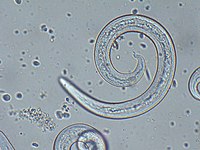
Host-specific serological response to Angiostrongylus vasorum infection in red foxes (Vulpes vulpes): implications for parasite epidemiology
Sign Up to like & getrecommendations! Published in 2017 at "Parasitology"
DOI: 10.1017/s0031182017000427
Abstract: SUMMARY Angiostrongylus vasorum is a cardiovascular nematode increasingly found in dogs and foxes in endemic foci throughout Europe. The present study evaluates ELISAs for detection of circulating antigens and specific antibodies against A. vasorum in… read more here.
Keywords: angiostrongylus vasorum; vulpes vulpes; vasorum; red foxes ... See more keywords

Detection of a characteristic beta-2 peak in serum by capillary zone electrophoresis in dogs with Angiostrongylus vasorum.
Sign Up to like & getrecommendations! Published in 2022 at "Veterinary clinical pathology"
DOI: 10.1111/vcp.13065
Abstract: BACKGROUND Angiostrongylosis is an emerging canine parasitic disease that often causes polyclonal hyperglobulinemia. In the authors' experience, we have seen what could be a typical serum protein electrophoretic pattern characterized by a large, symmetrical beta-2… read more here.
Keywords: beta; group; beta peak; capillary zone ... See more keywords

Is the Angiostrongylus vasorum infection in domestic dogs underestimated or misdiagnosed? A comprehensive presentation of four lethal cases
Sign Up to like & getrecommendations! Published in 2023 at "Frontiers in Veterinary Science"
DOI: 10.3389/fvets.2023.1146713
Abstract: Introduction Angiostrongylus vasorum (A. vasorum) is a widely distributed gastropod-borne nematode, causing severe cardio-pulmonary disorders in dogs. In Romania, A. vasorum was detected in foxes and serologically confirmed in domestic dogs, but no clinical cases… read more here.
Keywords: vasorum infection; presentation; infection; domestic dogs ... See more keywords

Hemostatic Dysfunction in Dogs Naturally Infected with Angiostrongylus vasorum—A Narrative Review
Sign Up to like & getrecommendations! Published in 2022 at "Pathogens"
DOI: 10.3390/pathogens11020249
Abstract: This narrative review aims to describe Angiostrongylus vasorum-induced hemostatic dysfunction of dogs with emphasis on clinical and laboratory findings as well as potential therapeutic strategies for the bleeding patient. Canine angiostrongylosis (CA) is a disease… read more here.
Keywords: dysfunction; angiostrongylus vasorum; hemostatic dysfunction; narrative review ... See more keywords

Angiostrongylus vasorum, Aelurostrongylus abstrusus, Crenosoma vulpis and Troglostrongylus brevior Infections in Native Slug Populations of Bavaria and Baden-Wuerttemberg in Germany
Sign Up to like & getrecommendations! Published in 2022 at "Pathogens"
DOI: 10.3390/pathogens11070747
Abstract: Angiostrongylus vasorum, Crenosoma vulpis, Aelurostrongylus abstrusus and Troglostrongylus brevior can cause severe cardiovascular and pulmonary symptoms in companion animals and wildlife. Recently, these nematodes were reported to spread within Europe and South America. The reasons… read more here.
Keywords: germany; wuerttemberg; abstrusus; vulpis ... See more keywords